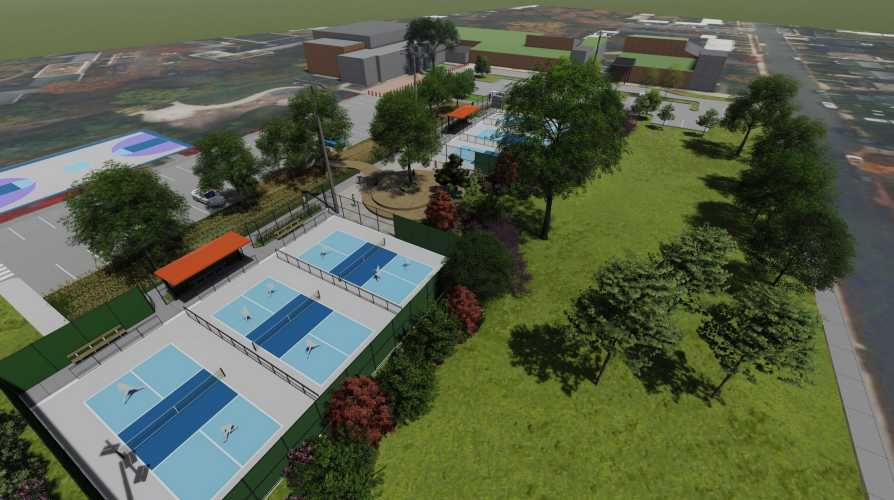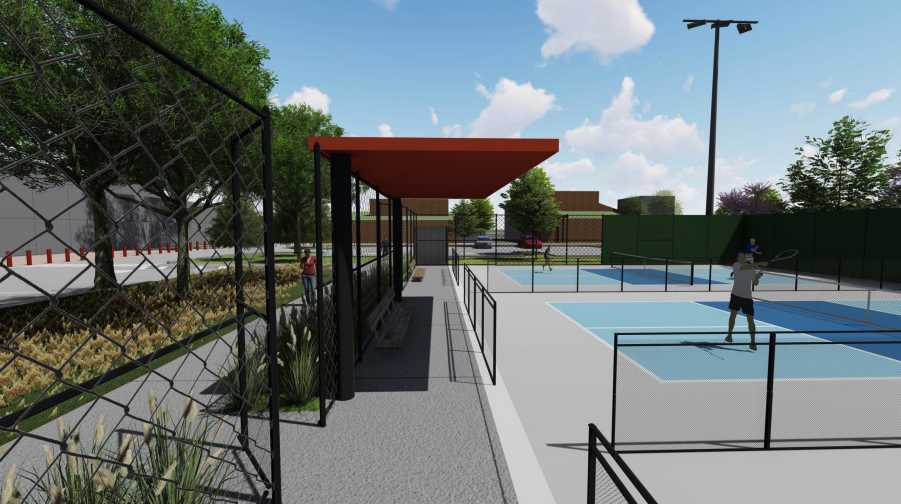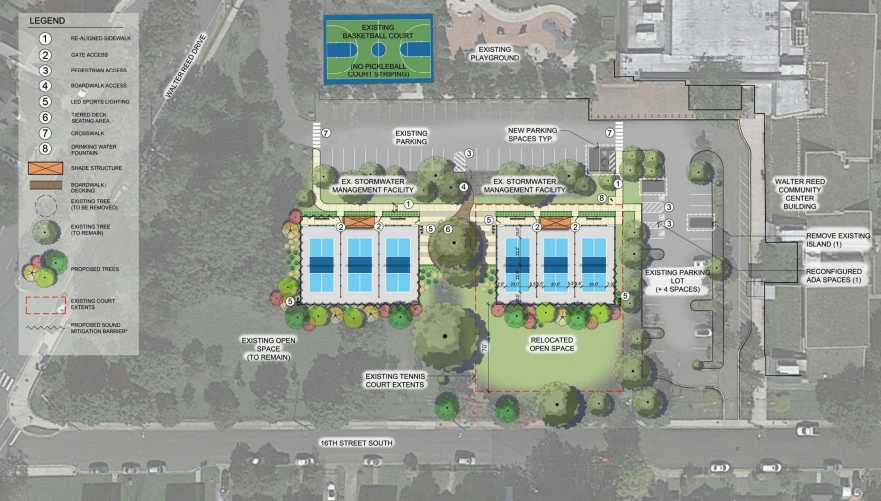Arlington County will continue with plans to build dedicated pickleball courts at the Walter Reed Community Center.
The county had mulled pausing the project, putting the question to community members in a survey this spring.
“Respondents were slightly more in favor of continuing the project, though it should be noted that respondents who identified as players are more in favor of continuing and those self-identifying as neighbors were more in favor of pausing,” Dept. of Parks and Recreation planning director Erik Beach told the Board on Tuesday.
DPR will forge ahead because the sport has health benefits and the center needs renovations either way, he said.
“The county firmly believes in the benefits of providing places for its residents to receive the physical and mental health benefits of being outside, recreating and socializing,” Beach said. “DPR has observed in real-time and validated through professional literature the opportunity provided by pickleball to be a catalyst for those physical and mental benefits.”
The county has selected designs that would:
- increase the distance between future courts near 16th Street S. and residential homes to a distance of about 170 feet
- add acoustic fencing to both sets of courts and landscaping in between
- add a deck to protect a large existing tree and provide respite space
- improve circulation for people with disabilities
- increase parking spaces by four
- resurface the basketball courts
An online survey about the proposal is open now through Dec. 8 and could inform tweaks DPR makes before selecting a contractor by the third quarter of 2024.
Columbia Heights Civic Association President Ron Haddox, meanwhile, is skeptical of the most recent survey. In a letter to the Board, he said the survey circulated in pro-pickleball online forums nationally and internationally, attaching screenshots.
He says pickleballers recommended people submit responses multiple times across platforms and identify as county or 22204 residents, “even if they were not.”
“This obviously concerns us and calls into question the genuineness of at least some portion of the feedback received,” he said.
Beach told the Board that DPR tried to improve the quality of the data by removing several hundred comments from people at least 10 miles away from the community center. In the age of virtual private networks, Haddox says, this may not have done much.
“The use of DPR’s anonymous survey methodology and subsequent efforts to enhance its usefulness have very likely resulted in skewed results that have limited usefulness other than to let the county know that nearly EVERYONE on BOTH sides of this issue is against the idea of permanent courts at WRCC,” he said in a letter to the County Board.
He reiterated that the project will “1) damage the value of WRCC to its pre-existing user base, 2) highly impact the quality of life for WRCC neighbors, while concurrently 3) failing to meet the pickleball community’s needs such that they will almost certainly continue to pursue additional, larger facilities on an ongoing basis.”
Interim County Board member Tannia Talento told DPR that anecdotally, adult day programs at Walter Reed and Arlington Mill community center lost access to gyms due to pickleball. She urged staff to track the programs impacted by extended play next year as part of an update to the 2019 Public Spaces Master Plan.
“I think having that transparency of what we’re giving up to accommodate the sport would be really helpful,” she said.
Locals can play pickleball at 35 multi-use and 15 indoor courts and, as of Nov. 1, people made 511 reservations and played for just under 700 hours, Beach said. This includes the 14 new multipurpose courts at Marcey Road, Virginia Highlands, Fort Scott and Hayes parks.
Responding to noise complaints from neighbors, the county installed acoustic fencing where courts were fewer than 300 feet from residences, including a temporary one at Walter Reed. DPR says new data suggests these fences work, bolstering early impressions from some civic association leaders.
Decibel levels were reduced 6.5 to 13.4 decibels after the fences went up, Beach said, noting a 10-decibel reduction equals a perceived 50% noise reduction.
“This gives us confidence that both of our new multi use courts in the future project acoustic fencing can play a positive role in sound mitigation,” Beach said.
That pleased Vice-Chair Libby Garvey, who said that she had received several emails predicting they will not work.
“People are always concerned, I get that, but it seems like they really are kind of working,” she said.
County Board Chair Christian Dorsey, meanwhile, wanted to know where all the private pickleball companies are, referencing the indoor operator Kraken Kourts in the Edgewood neighborhood of D.C.
“It’s our public responsibility to make sure we get a piece of that action,” he said.
County Manager Mark Schwartz said economic development staff are “constantly on the lookout” for commercial operators.
“If all the commercial pickleball purveyors are listening, we have plenty of space,” he said.




